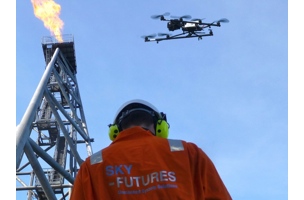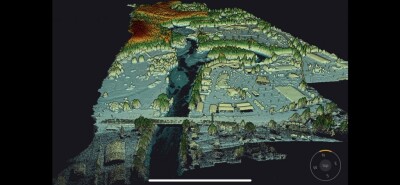Correction: This story originally reported that the exemption was the first for the oil & gas industry. According to the the FAA register of exemptions, this is not the case.
Houston-based Sky-Futures USA has been awarded a 333 Exemption from the FAA that permits the use of UAVs for oil and gas inspections in the USA.
In a release, the global company emphasized their strong track record in the global drone inspection market and listed clients including Talisman, Chevron, Conoco Philips, and Apache. Elaborating on work provided to those clients outside of the US, the company touted a “proven savings of US $4m+ for offshore drone inspections.”
The Exemption
In an email to SPAR, Sky-Futures VP of Business Development Jason Forte offered more details. As he described the exemption, the important factor is that it extends farther than the limits of US airspace, allowing Sky-Futures to operate within airspace that is managed by the US and within the Flight Information Region (FIR) boundary. “For example,” he said, “FIR Houston extends about 100nm offshore into the Gulf of Mexico.”
Permission to operate in the Gulf of Mexico offers a big opportunity for Sky-Futures USA, as well as many within the oil & gas industry that would like to make use of their services. “With one third of the world’s platforms sitting in the Gulf of Mexico,” Forte explained, “it is nice to finally be able to bring our expertise and safety record to the US.”
The process was not quick, though Forte was careful to note that Congress and the FAA have taken great strides toward responsible integration of UAVs into the national airspace. “We applied for the 333 Exemption on 25 Aug 14 and it was approved last Friday…about 200 days,” Forte said. “We are the 46th company approved to operate small UAVs commercially in the US. Today there are approximately 700 requests on the FAA’s desk.”
Benefits for Oil & Gas
Michael Drobac, Executive Director of the Small UAV Coalition explained the significance of this exemption to SPAR. The oil & gas industry, he told us, is one of the many areas “ripe” for the commercial use of UAVs, because the technology will protect lives and increase efficiency. “If we can save lives by detecting oil leaks or issues with our critical infrastructure by using UAVs, I think we are going to be way ahead in terms of our ability to protect the homeland and to provide consumers with assurances that we are doing the appropriate amount of inspections.”
The ability to use UAV technology, he explained, will allow oil & gas (and other industries that use it) to flourish. This is because UAV restrictions are forcing industries like oil & gas to use “technologies that are just not appropriate for what we want to accomplish.”
“I always put my faith in technology,” Drobac said. “Technology always wins in my view. And when you can apply it to sectors like the oil & gas industry through a Houston-based company, Sky-Futures USA, I’m tickled about the fact that we’re seeing the FAA make some movement.”
Can’t Fly Just Yet
As Forte told SPAR, though Sky-Futures has clients ready to commission work, the company won’t be starting their inspections just yet. “Just because we have the exemption doesn’t mean we can start operating commercially. We need a Certificate of Authorization, or COA. This is a whole different request process that can take up to 90 days. The COA is a more detailed form, informing the FAA of the type of work we will be doing and in what specific area. Once we have an approved COA, then we can start work.”
“So in that respect,” Drobac said, “there’s still some effort that has to be put in. I am thrilled about the petition, but I have to tell you, I’ll be more excited when they get their COA and they’re operating.”
Sky-Futures USA will be one of a dozen companies showcasing UAV solutions at SPAR International, March 30-April 2 in Houston, TX. Click here for more info.
Commercial UAV Expo, a new trade show and conference organized by SPAR 3D, will take place October 5-7, 2015 in Las Vegas. It focuses on the commercial UAV/UAS market in North America covering including Surveying & Mapping; Civil Engineering & Infrastructure; Mining; Construction; Process, Power & Utilities; Precision Agriculture; and Law Enforcement, Security, Emergency Response.






